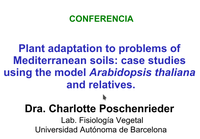Plant adaptation to problems of Mediterranean soils: case studies using the model Arabidopsis thaliana and relatives
: 07/06/2018 13:00
 1
/
1
1
/
1

Conferencia de la Dra. Charlotte Poschenrieder (Lab. Fisiología Vegetal. Universidad Autónoma de Barcelona).
Jueves 7 de junio de 2018 a las 12:00 en el Aula Jacques-Louis Lyons (M2). Facultad de Ciencias.
Resumen: Salinity and high carbonate contents are major problems for crop production on soils in the Mediterranean area. Saline soils reduce yield due to ion toxicity, osmotic stress and bad soil structure. On carbonate soils, major constraints are the low availability of certain essential nutrients, especially Fe, Zn, and P, the excess of bicarbonate and, occasionally boron, as well as the soil compactation and the shallow root systems. Our current research focuses on the mechanisms underlying tolerance to these soil-derived stress factors using natural populations of the model plant Arabidopsis thaliana and other related Brassicaceae species. Our approach uses common-garden field experiments, as well as laboratory studies for the identification of contrasting phenotypes and physiological processes related to sensitivity and tolerance. Crossing of extreme parentals followed by BSA sequencing, RNA seq and GWAS techniques are being used to identify responsible key genes. As A. thaliana natural populations can adapt only to moderate salinity and carbonate levels, other Brassicaceae are explored. Germplasm from the Mediterranean area, but also from extremely high saline and alkaline sites in Iran is used for this purpose.
Organizan: Departamento de Biología Vegetal. Facultad de Ciencias. Vicerrectorado de Investigación y Transferencia.







